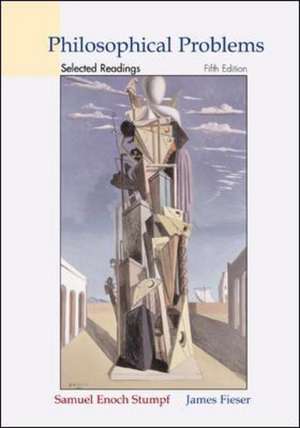Cuprins
* indicates new to this edition
PART ONE: THE MEANING OF LIFE
Plato (427-347BCE), APOLOGY: "A Life Worth Living"
*Chuang-tzu (c. 250 BCE), THE CHUANG-TZU: "Living in Accord with the Tao"Leo Tolstoy (1828-1910), MY CONFESSION: "The Inevitability of the Question, 'What is the Aim of Life?'"
Jean-Paul Sartre (1905-1980), EXISTENTIALISM AND HUMANISM: "The Human Condition"PART TWO: PHILOSOPHY OF MIND
Plato(427-347), PHAEDO: "Do Minds Survive after Death?"
*KATHA UPANISHAD (c. 500 BCE): "The Self-God"*QUESTIONS OF KING MILIINDA(c. 100 CE): "The Self in Flux"
Lucretius (c. 94-55 BCE), ON THE NATURE OF THINGS: "The Mind as Body"Rene Descartes (1569-1650), MEDITATIONS and THE PASSIONS OF THE SOUL: "The Distinction between Mind and Body"
*Anne Conway (1631-1678), THE PRINCIPLES OF THE MOST ANCIENT AND MODERN PHILOSOPHY: "Blurring the Distinction Between Mind and Body"George Berkeley (1685-1753), THREE DIALOGUES BETWEEN HYLAS AND PHILONOUS: "Consciousness, not Matter, the True Reality"
*David Hume (1711-1776), TREATISE OF HUMAN NATURE: "The Mind as a Bundle of Perceptions"Gilbert Ryle (1900-1976), THE CONCEPT OF MIND: "Descartes' Myth"
John Searle (b. 1932), MINDS, BRAINS, AND SCIENCE: "The Mind-Body Problem"PART THREE: PHILOSOPHY OF RELIGION
Anselm (1033-1109), PROSLOGIUM: "The Ontological Argument"
Thomas Aquinas (1224-1274), SUMMA THEOLOGICA: "Five Ways of Proving God's Existence"*Blaise Pascal (1623-1662), THOUGHTS: "Waging on Belief in God"
*David Hume (1711-1776), AN EQUIRY CONCERNING HUMAN UNDERSTANDING: "The Irrationality of Believing in Miricles"*David Hume (1711-1776), DIALOGUES CONCERNING NATURAL RELIGION: "Against the Design and Cosmological Arguments"
*J.L. Mackie (1917-1981), EVIL AND OMNIPOTENCE: "The Logical Problem of Evil"PART FOUR: EPISTEMOLOGY
Plato (427-347), THE REPUBLIC: "The Ascent to True Knowledge: The Divided Line and Cave"
*Sextus Empiricus (c. 200 CE), OUTLINES OF PYRRHONISM: "The Goals and Methods of Skepticism"Rene Descartes (1569-1650), MEDITATIONS: "Certainty and the Limits of Doubt"
John Locke (1632-1704), ESSAY CONCERNING HUMAN UNDERSTANDING: "The Origin of All Our Ideas in Experience"*David Hume (1711-1776), ENQUIRY CONCERNING HUMAN UNDERSTANDING, Sections 4 and 5: "Empiricism and the Limits of Knowledge"
Immanuel Kant (1724-1804), CRITIQUE OF PURE REASON: "How Knowledge is Possible"William James (1842-1910), PRAGMATISM: A NEW NAME FOR SOME OLD WAYS OF THINKING: "Pragmatism's Conception of Truth"
Bertrand Russell (1872-1970), PROBLEMS OF PHILOSOPHY: "Appearance and Reality"Arthur Eddington (1882-1944), THE NATURE OF THE PHYSICAL WORLD: "Common Sense Knowledge and Scientific Knowledge"
*Richard Rorty (b. 1931), PHILOSOPHY AND THE MIRROR OF NATURE: "Critique of Traditional Epistemology"PART FIVE: FREE WILL AND DETERMINISM
*Epictetus (c. 50-c. 120), HANDBOOK: "Resigning Oneself to Fate"
*David Hume (1711-1776), ENQUIRY CONCERNING HUMAN UNDERSTANDING: "The Argument for Determinism"*Thomas Reid (1710-1796), ESSAYS ON THE ACTIVE POWERS OF MAN: "The Argument for Free Will from Common Sense Beliefs"
William James (1842-1919), THE DILEMMA OF DETERMINISM: "How Can We Explain Judgements of Regret"John Searle (b. 1932), MINDS, BRAINS, AND SCIENCE: "The Freedom of the Will"
PART SIX: ETHICS
*Mencius (390-305 BCE) and Hsun-tzu (298-238 BCE), THE MENCIUS and THE HSUN-TZU: "Is Human Nature Inherently Good or Evil?"
Plato (427-347 BCE), EUTHYPHRO: "Does God Create Morality?"Aristotle (384-322 BCE), NICHOMACHEAN ETHICS: "Morality and Virtue"
*Epicurus (341-271 BCE), LETTER TO MENOECEUS: "Pleasure and Life's Aim"Immanual Kant (1724-1804), FUNDAMENTAL PRINCIPLES OF THE METAPHYSICS OF MORALS: "The Categorical Imperative"
John Stuart Mill (1806-1873), UTILITARIANISM: "Utilitarianism: Basing Morality on Consequences"Friederich Nietzsche (1844-1900), BEYOND GOOD AND EVIL, THE TWILIGHT OF THE IDOLS, and THE WILL TO POWER: "Turning Values Upside Down"
Carol Gilligan (b. 1936), IN A DIFFERENT VOICE: "Is there a Characteristically Feminine Voice Defining Morality?"*James Fieser, (b. 1958), MORAL PHILOSOPHY THROUGH THE AGES: "Cultural Relativism"
PART SEVEN: POLITICAL PHILOSOPHY
Plato (427-347 BCE), CRITO: "Obedience to the State"
Aristotle (384-322 BCE), POLITICS: "The Natural Basis of Society"Thomas Aquinas (1224-1274), THE TREATISE ON LAW: "Natural Law"
Thomas Hobbes (1588-1678), DE CIVE: "The Social Contract"*Mary Wollstonecraft (1759-1797), A VINDICATION OF THE RIGHTS OF WOMAN: "The Rights of Women"
Karl Marx (1818-1883), MANIFESTO OF THE COMMUNIST PARTY: "The Clash of Class Interests"John Stuart Mill (1806-1873), ON LIBERTY: "The Individual and the Limits of Government"
John Rawls (b. 1921), "Justice as Fairness"